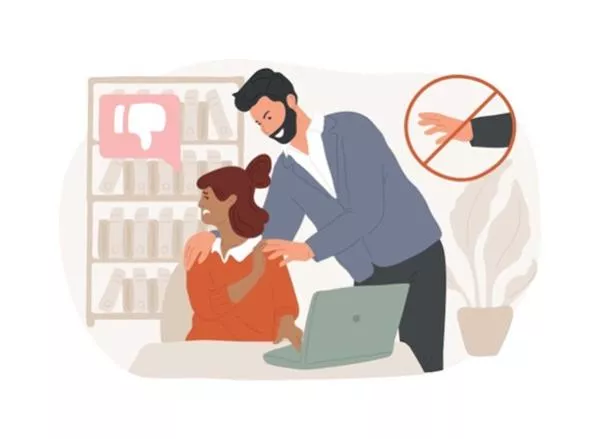The Scenario
A professional working at a prestigious corporate firm enjoys a productive work environment and is dedicated to career growth. However, over time, interactions with a senior colleague begin to take an uncomfortable turn.
At first, the comments seem like casual compliments on appearance or light-hearted jokes, but soon, they start feeling personal and inappropriate. The senior colleague begins making remarks about dressing style, repeatedly finds reasons to initiate physical contact (such as placing a hand on the shoulder or guiding by the lower back), and sends late-night messages under the pretext of discussing work.
One day, after an official corporate event, the senior colleague offers a ride home. Upon politely declining, the response is a dismissive laugh followed by, "Come on, don't be so formal. After all, I've been helping you out a lot at work." The situation feels uncomfortable, yet fear of being seen as overly sensitive or unprofessional makes it difficult to react immediately.
This is a clear example of sexual harassment in the workplace, and it falls under the POSH Act (Prevention of Sexual Harassment at Workplace Act, 2013). Recognising the situation and knowing the next steps are crucial for ensuring safety and professional integrity.
Understanding Sexual Harassment Under the POSH Act
The POSH Act, 2013, defines sexual harassment as any unwelcome behaviour of a sexual nature at the workplace, including:
- Physical contact and advances: unnecessary or inappropriate touching, even if subtle.
- Sexually coloured remarks: comments about personal appearance, inappropriate compliments, or suggestive jokes.
- Demanding or requesting sexual favours: direct or indirect suggestions for personal or intimate favours in return for professional benefits.
- Showing pornography: sending explicit content via messages, emails, or in person.
- Any other unwelcome physical, verbal, or non-verbal conduct of a sexual nature; this includes persistent texting, staring, or making suggestive gestures.
Even if the behaviour seems indirect or disguised as humour, it can still constitute harassment if it creates an uncomfortable, hostile, or intimidating work environment.
What to Do Next?
If faced with such a situation, here are the steps to take under the POSH Act:
Recognize That This Is Harassment
One of the biggest reasons sexual harassment goes unreported is self-doubt—wondering whether the behaviour was intentional, whether it was "just a joke," or fearing being labelled as overly sensitive.
It is important to remember that harassment is about how the behaviour makes you feel. If it is unwelcome, uncomfortable, or inappropriate, it is harassment.
Document Everything
Maintaining a detailed record of the incidents is crucial, especially if they happen repeatedly.
- Write down the date, time, location, and details of what was said or done.
- Save digital proof: messages, emails, screenshots, or any inappropriate comments made on work platforms.
- List witnesses: If any colleagues were present during an incident, note their names.
A well-documented case strengthens credibility and helps during the formal complaint process.
Set Boundaries(If Safe to Do So)
Sometimes, directly addressing the issue can stop it. If comfortable, clearly communicate that the behaviour is unacceptable.
A firm but professional response might be:
- "I prefer to keep our interactions professional. Please avoid comments on my appearance."
- "I am not comfortable with physical contact. Let's maintain a professional distance."
- "I would appreciate it if we discussed work only during office hours."
If the behaviour stops, this may be the only step needed. However, if the harassment continues, further action should be taken.
Report the Issue to the Internal Complaints Committee (ICC)
Under the POSH Act, every organisation with 10 or more employees must have an Internal Complaints Committee (ICC) that handles workplace harassment complaints.
Steps to File a Complaint:
- Submit a written complaint to the ICC within three months of the incident. This can be extended if there are valid reasons for the delay.
- Attach supporting evidence, such as screenshots, emails, or witness statements.
- Attend the inquiry process, where both parties will be given an opportunity to present their case.
The ICC must investigate the complaint confidentially and recommend appropriate actions, including warnings, transfers, suspension, or termination of the offender, based on the severity of the offence.
Seek Support from HR or Trusted Colleagues
If hesitant about filing a formal complaint, speaking to a trusted senior colleague, HR representative, or mentor can provide guidance on how to proceed. Organisations often have employee assistance programs (EAPs) or counselling services that offer support in handling workplace harassment situations.
Escalate the Complaint if Necessary
If the ICC fails to take appropriate action or the organisation does not have an ICC, the case can be taken to the Local Complaints Committee (LCC) under the jurisdiction of the district administration.
Legal action can also be pursued under:
- Section 354 of the IPC: Assault or criminal force against a woman with the intent to outrage her modesty.
- Section 509 of the IPC: words, gestures, or acts intended to insult modesty.
Under the POSH Act, retaliation against the complainant (such as demotions, negative feedback, or threats) is illegal.
Prioritize Emotional and Mental Well-Being
Experiencing harassment can be emotionally draining. Seeking professional counselling, talking to trusted friends or family members, and practicing self-care can help in processing the experience.
Remember, reporting harassment is not just about personal justice it also helps create a safer workplace for others who may be going through similar experiences.
Final Thoughts
Sexual harassment is not just about extreme cases of misconduct- it includes any behaviour that makes an employee feel unsafe or uncomfortable at work. The POSH Act is designed to ensure a work culture where every employee, regardless of gender or position, feels respected, valued, and secure.
If you or someone you know is facing such a situation, take action, seek support, and remember that your workplace must be a space where you feel safe and empowered.

Comments